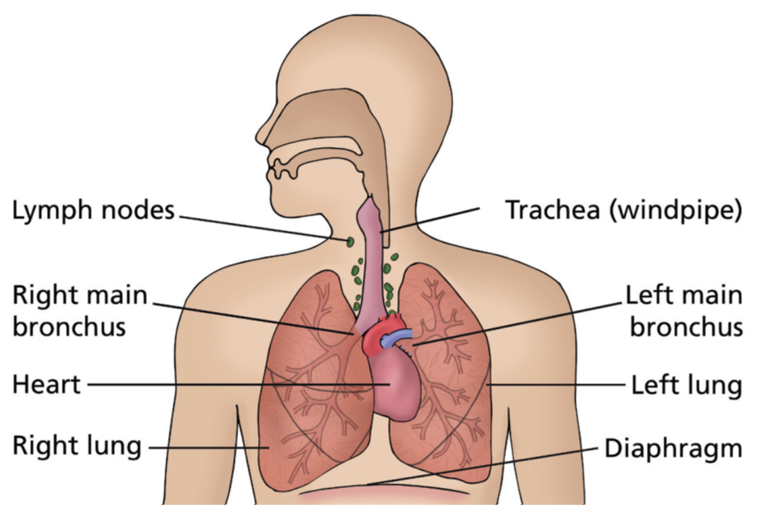Lung cancer is the third most common and serious types of cancer in the UK. Around 47,000 people are diagnosed with the condition every year in the UK.
Primary lung cancer is cancer that starts in the lung.
Sometimes cancer spreads to the lungs from elsewhere in the body. This is called lung metastases or secondary lung cancer
Am I at risk?
Smoking is the leading cause of lung cancer. This means smokers and ex-smokers have an increased risk of getting lung cancer. However, it is by no means the only cause; in fact 28% of lung cancer cases aren’t caused by smoking.
Anyone can get lung cancer. By knowing the common causes of lung cancer and taking steps to avoid or address them can help reduce your risk of getting the disease.
- Smoking – the more you smoke, the bigger the risk
- Passive smoking – the risk from breathing other people’s smoke is much less than smoking yourself
- Age – lung cancer is more common in older people. It is rare under the age of 40
- Exposure to asbestos, radon gas and other occupational chemicals
- Diesel fumes
Types
There are two main types of primary lung cancer, which behave and respond to treatment differently. They are:
- non-small cell lung cancer (NSCLC)
- small cell lung cancer (SCLC)
About 15% of lung cancers (less than 1 in 5) are small cell; the rest are non-small cell.
Non-small cell lung cancer
There are three main types of non-small cell lung cancer (NSCLC). Sometimes it’s not possible to tell which type someone has. This is because when the cells are looked at under a microscope, they are not developed enough or the biopsy doesn’t contain enough cells to diagnose the different types of NSCLC.
- Squamous cell carcinoma – This is the most common type of lung cancer. It develops in the cells that line the airways. This type of lung cancer is often caused by smoking.
- Adenocarcinoma – This develops from the cells that produce mucus in the lining of the airways. This type of cancer is becoming more common.
- Large cell carcinoma – This gets its name from the large, rounded cells that are seen when they are examined under a microscope. It’s sometimes known as undifferentiated carcinoma.
Small cell lung cancer
Small cell lung cancer is called this because when the cancer cells are looked at under a microscope they are very small. It’s sometimes called oat cell cancer.
Small cell lung cancer is usually caused by smoking, and it’s rare for someone who has never smoked to develop this type of lung cancer. Small cell lung cancer is often fast-growing and can spread quickly.
Mesothelioma
Mesothelioma is a cancer of the mesothelium. This is a thin lining (membrane) that covers the outer surface of many organs in the body. It also lines the spaces (cavities) within the body, such as the chest and abdominal cavity.
The mesothelium has different names depending on where it is in the body. For example:
- the mesothelium in the chest is called the pleura
- the mesothelium the tummy (abdomen) is called the peritoneum.
9 out of 10 cases of Mesothelioma are caused by exposure asbestos fibres.
Rarer types of lung cancer
A rare type of cancer, called a carcinoid tumour, can sometimes develop in the lungs. Carcinoid tumours are a type of neuroendocrine cancer. The neuroendocrine system is a network of glands that produce hormones, which helps the different organs of the body to function. Rarer types of cancer, such as soft tissue sarcomas, can also develop in the lungs.
Symptoms of primary lung cancer
The symptoms of lung cancer may include any of the following:
- a persistent cough or hoarse voice
- coughing up blood
- a chest infection that doesn’t get better, or repeated chest infections
- persistent breathlessness
- unexplained tiredness and weight loss
- an ache or pain when breathing or coughing
- chest pain or shoulder pain that doesn’t get better
If you have any of these symptoms for more than three weeks, it’s important to have them checked by your GP. All of these symptoms may also be caused by illnesses other than cancer.
Patient information
For more information from Macmillan regarding lung cancer, please follow this link.
For more information from Cancer Research UK regarding lung cancer, please follow this link.
Roy Castle provides really useful information on lung cancer and this can be found by following this link.
Mesothelioma
There are a number of websites that are great sources of information for patients with Mesothelioma. These can be accessed by clicking on the links below.
